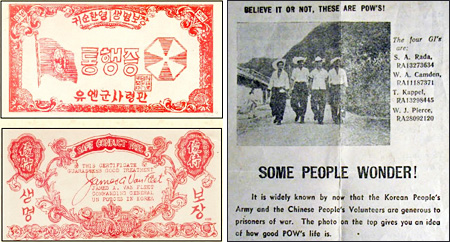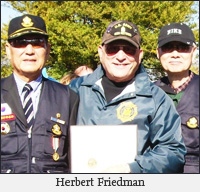
US, N. Korea sowed seeds of doubt

Six decades ago, the U.N. forces led by the United States fought against the North on Korea battlefields, not only with guns but also with thought tactics to defeat the enemy with fewer causalities.
Psychological warfare such as propaganda leaflets, posters, and radio shows were widely used during the bloody war which broke out 62 years ago today after North Korea launched a surprise attack on the South.
They were popular methods because each side calculated their opponents would suffer as soldiers would surrender and, as a result, reduce the number of enemy troops.
“Our psychological warfare operation tried to convince the South Koreans to support their government and not help the communists, and asked the communists to stop fighting and live in peace,” Herbert Friedman, a retired sergeant major who was discharged in 1995 after 26 years of service, told The Korea Times.
“We did some divide and conquer claiming that Stalin or Mao Zedong was now in charge and North Korea had become a vassal state. Their psychological warfare operation tried to divide the United States from the British and Canadians and blacks and Hispanics from white soldiers.”
Friedman, a psychological warfare expert having written more than 130 articles, said there is no real way to determine which side did better. He said he believes the number of prisoners of war could be used as criteria to gauge the effectiveness of the operations.
According to U.S. data, more than 600 million leaflets were dropped on North Korean and Chinese communist forces from June 1950 to mid-September 1951. Military experts estimate several billion leaflets were spread during the war.
The propaganda leaflets were effective. A U.S. document said an actual count of prisoners of war taken by the U.N. forces shows that one out of three of them surrendered due to the influence of the propaganda project.
‘Safe conduct passes’
Some of the famous North Korean leaflets were the “safe conduct passes” designed by the Psychological Warfare Section of the Eighth U.S. Army Korea. The leaflets, written in Korean and Chinese, imitated the North Korean 10 won note of 1947 to ensure that they would be easily spotted and picked up.
The propaganda leaflets read that North Korean and Chinese soldiers would be treated favorably and humanely if they surrendered to the allied forces with the passes. Thousands of North Koreans did.
North Koreans also produced and disseminated propaganda materials in Korean, English and Spanish.
Friedman said the United States was the prime target. “Numerous leaflets depicted the problems of American minorities back in the United States. Other leaflets told the Americans of the good treatment they would receive in a North Korean prison camp,” he said.
In a declassified secret technical U.S. document, George Pettee under the auspices of the Operations Research Office of Johns Hopkins University said North Koreans revealed highly professional skills in revolutionary propaganda and agitation.
“The enemy psywar operation differs from the American in many respects and is far more elaborate and intensive in the aggregate. The enemy has attempted, with his resources, to copy our methods of production and dissemination,” he said.
In the leaflets, North Koreans called for the emancipation of women, the emancipation of labor from capitalism, a youth program, redistribution of land and the communist ideal.
North Koreans also used media as a propaganda tool. In 1952, they started a radio and newspaper campaign claiming that the U.N. forces were using germ warfare.
“The claims were obvious fabrications but some Third World countries gave them limited credence,” said Friedman.
Over six decades after the forgotten war, psychological warfare is still widely used in major war and military operations.
In May 2010, the Ministry of National Defense announced it would resume psychological warfare against the North after it was suspended in June 2004.
The military installed speakers near the military demarcation line dividing the two Koreas to broadcast anti-North Korean propaganda to the Stalinist state.
“Psychological operations seem to still be important in military advances. When your side is winning, psychology warfare works,” said Friedman. “The enemy must know that he is being defeated and thus loses spirit. If he truly is dedicated and believes in ultimate victory, all the psychology operations in the world are useless.” <The Korea Times/Kang Hyun-kyung>



